Summary
- Use of AI is expected to grow significantly over the next five years, driven by the potential for efficiencies. Principal current uses of AI include factual and legal research, data analytics and document review. AI assistance in drafting and in evaluating legal arguments is also expected to increase, but significant concerns persist about accuracy, ethical issues and AI’s ability to handle complex legal reasoning.
- The principal drivers for the increased use of AI in international arbitration are saving party and counsel time (54%), cost reduction (44%) and reduction of human error (39%).
- The principal obstacles to the greater use of AI in international arbitration are concerns about errors and bias (51%), confidentiality risks (47%), lack of experience (44%) and regulatory gaps (38%).
- Respondents largely approve of the use of AI by arbitrators to assist in administrative and procedural tasks. There is strong resistance, however, to its use for tasks requiring the exercise of discretion and judgment, which are fundamental aspects of the mandate given to arbitrators.
- The general consensus is that, over the next five years, international arbitration and its users will adopt, and adapt to, AI. Respondents predict that arbitrators will increasingly rely on AI (52%) and that new roles to work with AI will emerge (40%). The enthusiasm for greater use is tempered, however, by the desire for transparency, clear guidelines and training on the use of AI.
Use of AI: Beginning to boom
In our 2018 Survey, 78% of respondents agreed that AI should be used more often in international arbitration, although 68% admitted they 'never' or 'rarely' used it.47 In our 2021 Survey, respondents continued to express some reservations about using AI, with 59% disclosing they 'never' or 'rarely' did so.48 We sought to explore whether there have been any changes in both perceptions and actual, or expected, usage of AI. Respondents were asked about their past and expected future use of AI tools and technology to assist with six different categories of tasks commonly carried out in arbitration. The clear message is that AI usage will boom in the next five years. Even those who have never used AI for arbitration tasks largely expect to incorporate it into their future practice.
AI was seen as an “efficiency booster”, particularly for organising large datasets and identifying trends
In the past five years, respondents have most commonly used AI for conducting factual and legal research (64%), and the vast majority (91%) expect to use AI for this purpose over the coming five years. Many respondents acknowledged AI's potential in this area; nonetheless, concerns were raised about accuracy, with some highlighting perceived linguistic or cultural biases with some AI platforms and the risk of uncertain quality of both data sources and AI-generated content, put by one interviewee in terms of "garbage in, garbage out". One respondent cautioned that large language model-based AI (LLMs) should not be relied upon blindly since it is designed to produce only predictive text: "It is not Wikipedia on steroids—it is predictive text on steroids."
While AI adoption in data analytics has been more moderate, respondents expect to use it significantly more going forward. AI was seen as an “efficiency booster”, particularly for organising large datasets and identifying trends. One counsel recounted their experience of using a proprietary tool utilising AI semantics to analyse the experience sections of arbitrators’ résumés, which resulted in a significant decrease in the time required to prepare a list of potential candidates.
AI has been used sparingly for drafting correspondence, with 59% of respondents stating they have never used AI for this task, although 75% expect to do so in the future. Some counsel found it helpful for generating first drafts but noted limitations, including difficulty in AI capturing "the particular tone necessary in arbitration". In a similar vein, one respondent described AI-generated drafts as "too bombastic". Nevertheless, some arbitral institution staff found that AI was highly effective at preparing and formatting standard correspondence.
The great majority of respondents (72%) reported never using AI for drafting submissions, citing concerns about accuracy and reasoning. Despite this, 66% of respondents expect to use AI for this purpose at least sometimes in the next five years. One counsel touched on one of the challenges of using AI for complex legal drafting, stating, "AI can do a first draft of a submission, but it should not evaluate legal arguments." Others warned that current LLMs may be prone to hallucinations or may be unsuitable for complex and sophisticated legal drafting. In interviews, junior counsel and institution staff appeared more inclined to use AI for first drafts, whereas more seasoned counsel and arbitrators were more resistant, citing quality control, reputational risk or a wholesale rejection of delegating tasks requiring human judgment to AI tools.
Evaluating legal arguments was an equally uncommon use of AI with the vast majority (71%) never having tried it out, although 69% expect to do so at least sometimes in the next five years. Many interviewees again highlighted the risks of AI oversimplifying complex legal reasoning: "Legal arguments are a jungle—AI might make them briefer, but not necessarily better". Others worried that current AI applications lack reasoning capabilities.
The findings indicate a clear shift towards greater adoption of AI in arbitration. While AI is at present primarily used for research, document review, and data analytics, future adoption is expected to expand across all surveyed tasks. However, concerns about accuracy, confidentiality, and ethical implications endure. As one respondent summarised, "AI is a tool, period. It should assist but not replace human judgment."
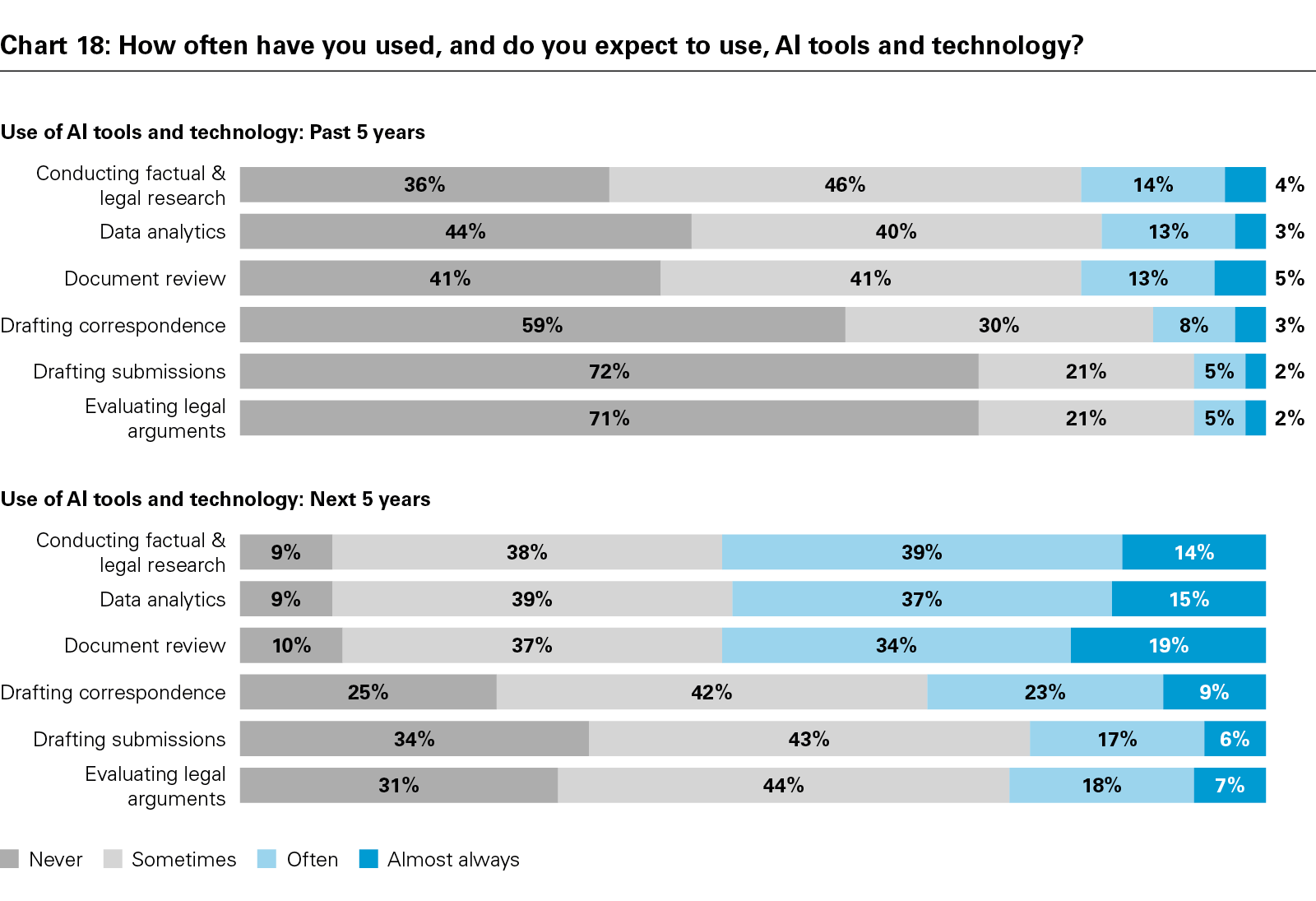
View full image: Chart 18: How often have you used, and do you expect to use, AI tools and technology? (PDF)
Why AI?
We asked what respondents considered to be the principal drivers for greater use of AI in international arbitration. They were invited to select up to three options from a list, with a free text 'other' option.
AI can make the whole process of dispute resolution much more economical and faster, assuming it is done in a proper way
The most selected reason was the potential to save party and counsel time (54%). Respondents highlighted successfully using AI to assist with labour-intensive tasks, such as producing chronologies and summarising witness statements and depositions, as well as document management and review processes. Notably, interviewees speculated on the potential to use AI in place of junior legal staff for these kinds of tasks, and the associated time and cost savings. As one respondent put it, "Certain things are labour-saving; maybe AI can save money and equalise resources." Several interviewees remarked that arbitral institution staff also benefitted from efficiency gains, for instance by saving time in arbitrator selection processes or drafting routine correspondence.
The potential to reduce human error and inconsistencies was selected by 39% of respondents. In a similar vein, the possibility to ensure greater predictability and consistency in arbitration was selected by 21%. Some believed that increased use of, and familiarity with, AI tools would yield more predictable and consistent results "by reducing subjective variations". One arbitrator predicted, "There will be a moment when confidentiality issues are alleviated, and AI becomes a commercial advantage for parties allowing for faster organisation and reduction of human oversight errors."
Saving arbitrators' time was also seen as a key driver (36%). One arbitrator opined that AI tools, "Will revolutionise the way we work. What used to take hours now takes seconds." Another interviewee highlighted the potential to save time by using AI to prepare procedural backgrounds, especially if a tribunal secretary is checking rather than crafting the first draft.
Access to AI as a means for participants with unequal resources to be more competitive was chosen by 26% of respondents. Interviewees remarked on how this could increase choice of counsel for clients. Another observed that in document or evidence-heavy arbitrations, such as in construction disputes, AI can help speed up the process and "ensure an equality of arms".
By contrast, a perception of competitive disadvantage if AI is not used was selected by 25%. As one participant stated, "Either you adapt to the tools, or the market will leave you behind." Others interestingly felt that the pressing issue is not about whether to use AI products but, rather, how to adapt business models to reflect the impact of such use: "The challenge will be adjusting billing structures as clients insist on efficiency and fixed fees."
Similarly, client or other stakeholder expectations for AI use were cited by 19% of respondents. Interviewees shared their experiences of clients increasingly asking whether they used AI, with cost a key consideration. Others anticipate that information security concerns will lead to client demand for use of closed AI tools rather than open-source models.
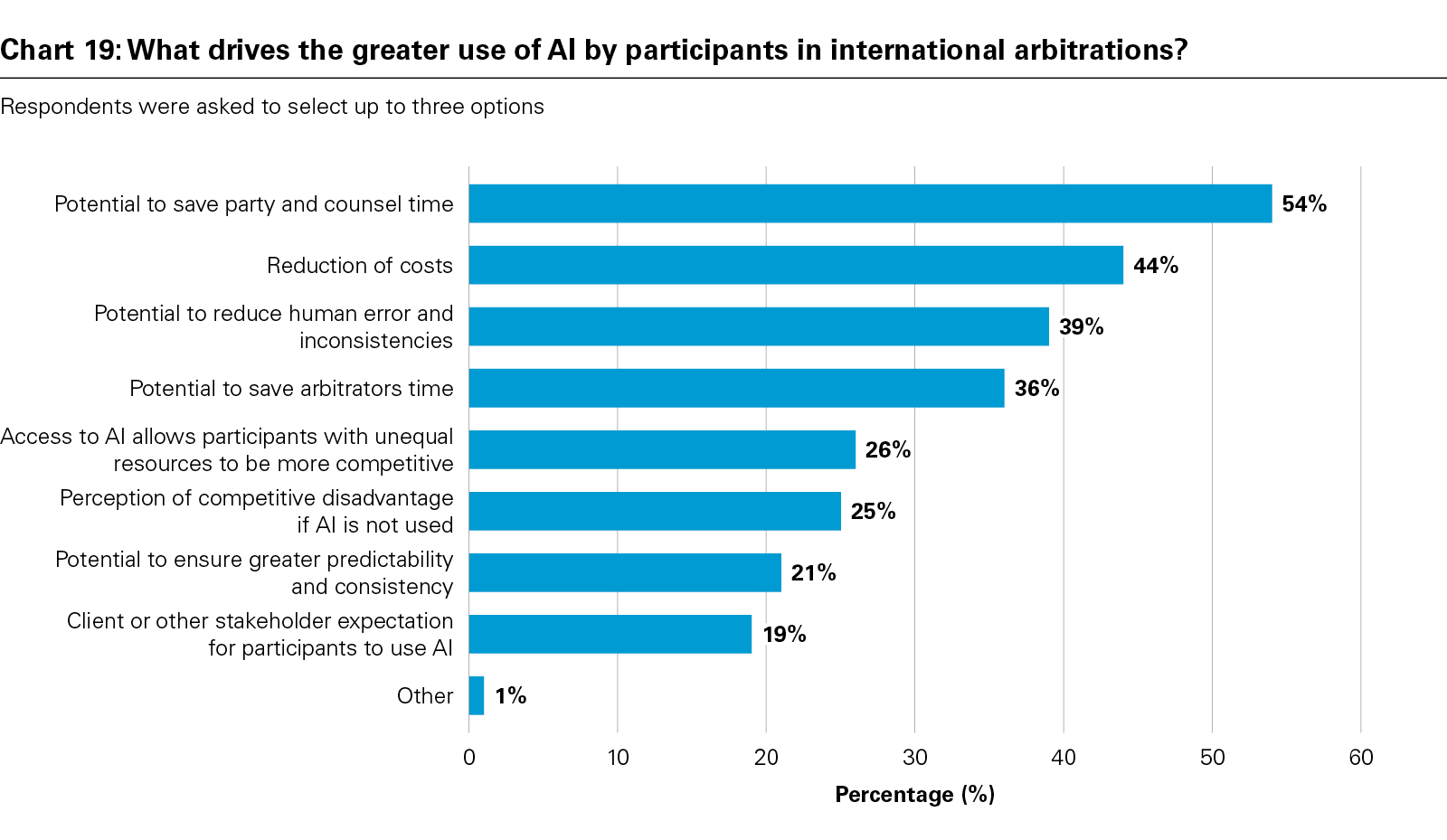
View full image: Chart 19: What drives the greater use of AI by participants in international arbitrations? (PDF)
Adopting AI: Roadblocks ahead
We asked respondents to identify the principal obstacles to the greater use of AI in international arbitration, selecting up to three options from a list or adding 'other' options in a free text box.
The most significant obstacle cited was the risk of undetected AI errors and bias, selected by 51% of respondents. Concerns were frequently raised about the risk of hallucinations. Interviewees also highlighted that AI lacks the ability to independently verify results. One noted that "AI is only as smart as the lawyer asking the question", another adding, "If you ask the wrong question, you get the wrong answer."
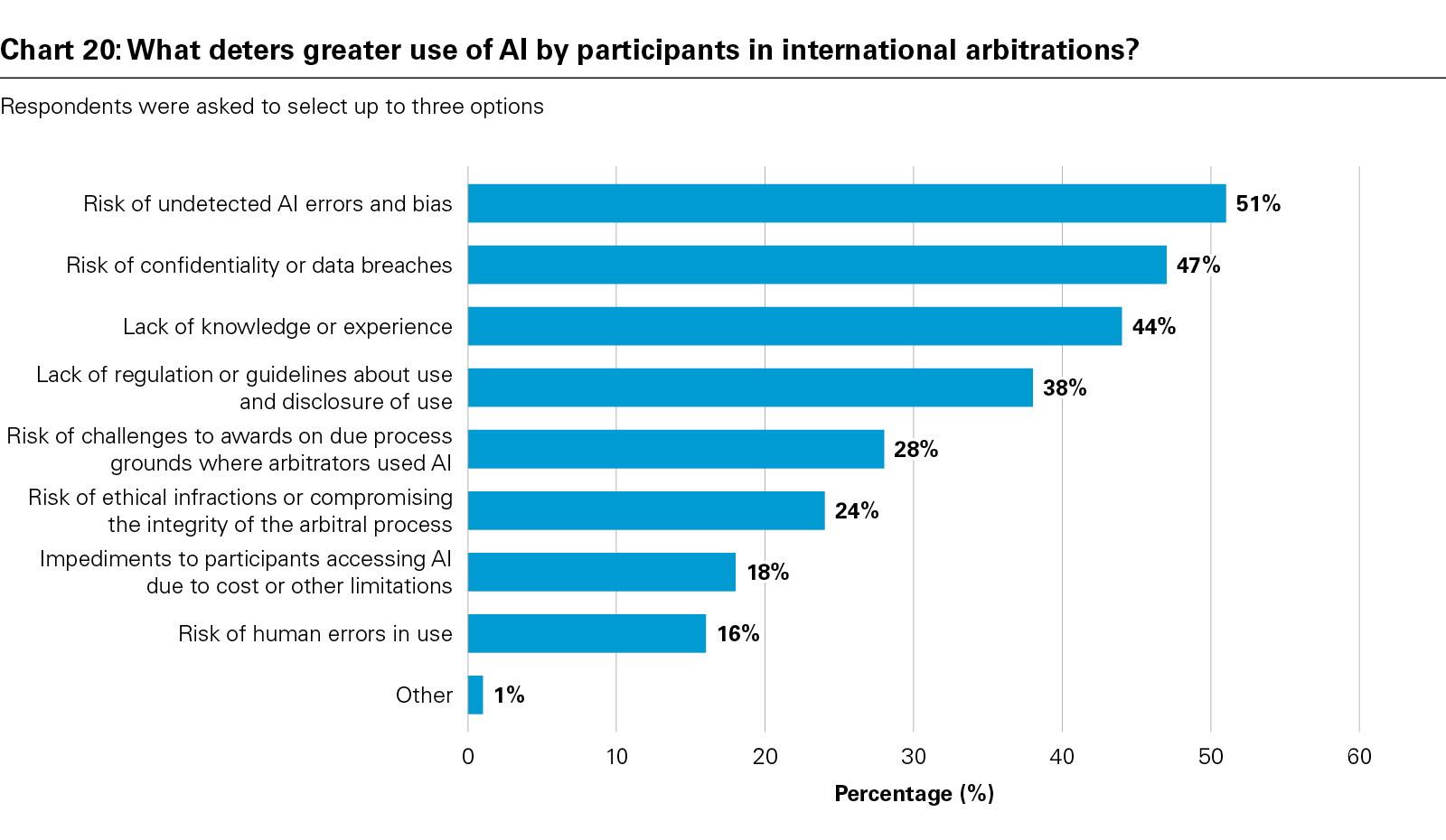
View full image: Chart 20: What deters greater use of AI by participants in international arbitrations? (PDF)
The risk of confidentiality or data breaches is also considered to be a major obstacle (47%). Participants repeatedly expressed concerns about data security when AI tools process confidential arbitration materials and risks inherent in AI's data processing capabilities, emphasising the dangers of using open-source AI tools without adequate safeguards.
A lack of knowledge or experience with AI was also a significant impediment (44%). Many users of arbitration are unfamiliar with AI's capabilities, leading to hesitation in its adoption. Respondents stressed the need for training and guidelines as the AI landscape continues to evolve. Without this, they fear that users may unknowingly misuse AI.
The risk of challenges to awards based on due process concerns was another key obstacle (28%). Participants feared that if AI is used even in part to generate awards, this could lead to post-award challenges—indeed, some had witnessed this phenomenon in litigation. Interviewees overwhelmingly called for transparency not only on the fact of use of AI, but also how it was used and for what tasks. This was considered to be particularly important when AI was used by arbitrators in the drafting of awards.
Ethical infractions or compromising the integrity of arbitration were the next greatest perceived risk (24%). Some respondents worried that reliance on AI could erode fundamental principles such as due process, equality of arms and responsibility for decision-making: "An arbitrator must know their case better than anyone else. AI cannot replace that fundamental duty."
Impediments to accessing AI due to cost or other limitations were cited in 18% of responses. Participants noted that small law firms and businesses, as well as developing countries, might struggle to meet the price of premium legal AI products. They warned that higher costs of accessing AI may create divisions between the "haves and the have-nots".
Other concerns included the risk of human errors in AI use (16%), where respondents warned of misapplication due to inadequate understanding of the technology. One arbitrator remarked, "Many practitioners are conservative about AI. Some reject it outright based on extreme malpractice cases, which does not reflect the technology's true potential."
AI's potential benefits are tempered by serious concerns regarding accuracy, confidentiality, data quality, lack of guidelines, and ethical considerations. The role of AI in decision-making and potential impact on procedural fairness also remain contentious. Critical to respondents was responsible use to avoid AI becoming a "Wild West" in arbitration.
AI and arbitrators: What's appropriate?
The survey asked participants whether it is appropriate for arbitrators to use AI for a number of different tasks. In each case, respondents were instructed to assume that the arbitral tribunal would both oversee the process and review the output.
A strong majority (77%) found it appropriate for arbitrators to use AI to assist in calculating damages, costs and interest to be awarded. Supporters emphasised that this task is primarily mathematical, requiring precision rather than discretionary judgment. However, all interviewed quantum experts expressed profound reservations about relying on AI with no transparency as to the underlying methodology or assumptions used by a tool to perform damages quantum calculations, explaining, "AI doesn't work like a computer. It is a 'black box' with no possibility for a human to check the methodology."
The use of AI to summarise submissions or evidence was also widely accepted (66%). Many saw AI as a cost-efficient tool to process large volumes of material, but concerns remained about accuracy and bias. Some arbitrators welcomed this use, while others expressed a lack of confidence and reminded that judgment calls should be made by humans, not AI: "Summarising the facts is part of the cognitive process of decision-making."
There was also general acceptance of arbitrators using AI to assist in drafting procedural orders and non-dispositive portions of awards or decisions, with 60% in favour.47 Some respondents saw AI as useful for tasks such as compiling procedural histories; others were more wary, stressing that AI should be used cautiously for any kind of drafting.
The strongest opposition was to AI being used to draft legal reasoning portions of awards or decisions, with only 23% approval. AI usage was also viewed with great scepticism when it came to assessing the merits or accuracy of party submissions or evidence, although 31% were in favour. Many respondents were concerned that AI would interfere with the arbitrator's fundamental role to fulfil their mandate. Others added that the rationale behind an LLM-generated text cannot be reliably ascertained. The prevailing sentiment was that reasoning must remain an arbitrator's responsibility. Citing Henry Kissinger, one interviewee cautioned that using AI in place of human reasoning would signal "the end of the age of enlightenment".
Overall, the responses reflect enthusiasm for the potential efficiency where arbitrators use AI, especially as a secondary tool to “check the work done”. The survey results suggest that use of AI by arbitrators is largely accepted for procedural and administrative functions. However, it faces strong resistance for tasks involving the exercise of discretionary judgment, with scepticism regarding reliability and concern about ethical implications. There is an overall expectation that acceptance and use of AI by arbitrators may grow, but only when disclosed and under well-regulated and transparent conditions.
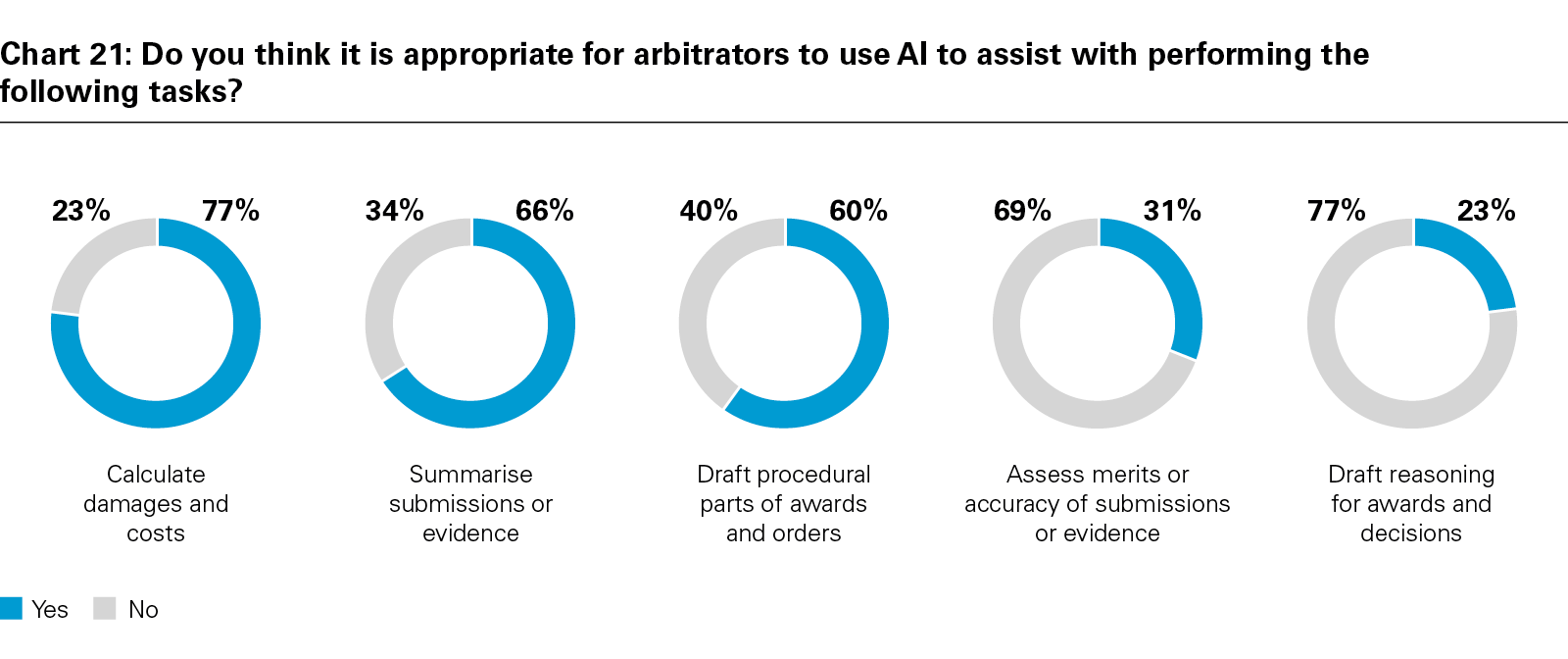 View full image: Chart 21: Do you think it is appropriate for arbitrators to use AI to assist with performing the following tasks? (PDF)
View full image: Chart 21: Do you think it is appropriate for arbitrators to use AI to assist with performing the following tasks? (PDF)
The path towards Arbitration 2.0?
How do respondents expect AI to impact the practice of international arbitration over the next five years? They were asked to choose three options from a list, including an 'other' option with a free text box.
More than half of respondents (52%) think that arbitrators will increasingly rely on AI. Appropriate use of AI by arbitrators for efficiency and cost-reduction is increasingly expected. Indeed, one counsel asserted that there is a "duty for arbitrators to keep up with the times".
International arbitration and its users will, most certainly, both adopt, and adapt to, AI
48% of respondents believe AI will make arbitration faster; this was especially so in the opinion of respondents based in Asia-Pacific (55%), while those based in Europe were less sure (30%). Some emphasised that the range of available AI tools to assist with different aspects of arbitration work could allow for shorter procedural timeframes, especially for written submissions. One interviewee, however, warned that, "Arbitration will not necessarily become faster—you may have a new layer of procedure in which lawyers object about the use of AI!"
The creation of new roles to manage and implement AI was also frequently chosen (40%). Some observed this is already happening, together with a growing expectation for lawyers to be trained in using AI.
Respondents also expect arbitrations to become cheaper (25%). As one respondent noted, "People are investing a lot in AI—they will want to see results." One interviewee even mused whether, in the future, parties will turn to AI instead of relying on counsel.
Conversely, some respondents expressed scepticism about AI's role in arbitration in the near future, although they were generally in the minority. Only 11% of respondents believed arbitrators will not increasingly rely on AI, while 9% expected arbitrations to become more expensive, with respondents notably concerned about the financial cost of premium AI products.
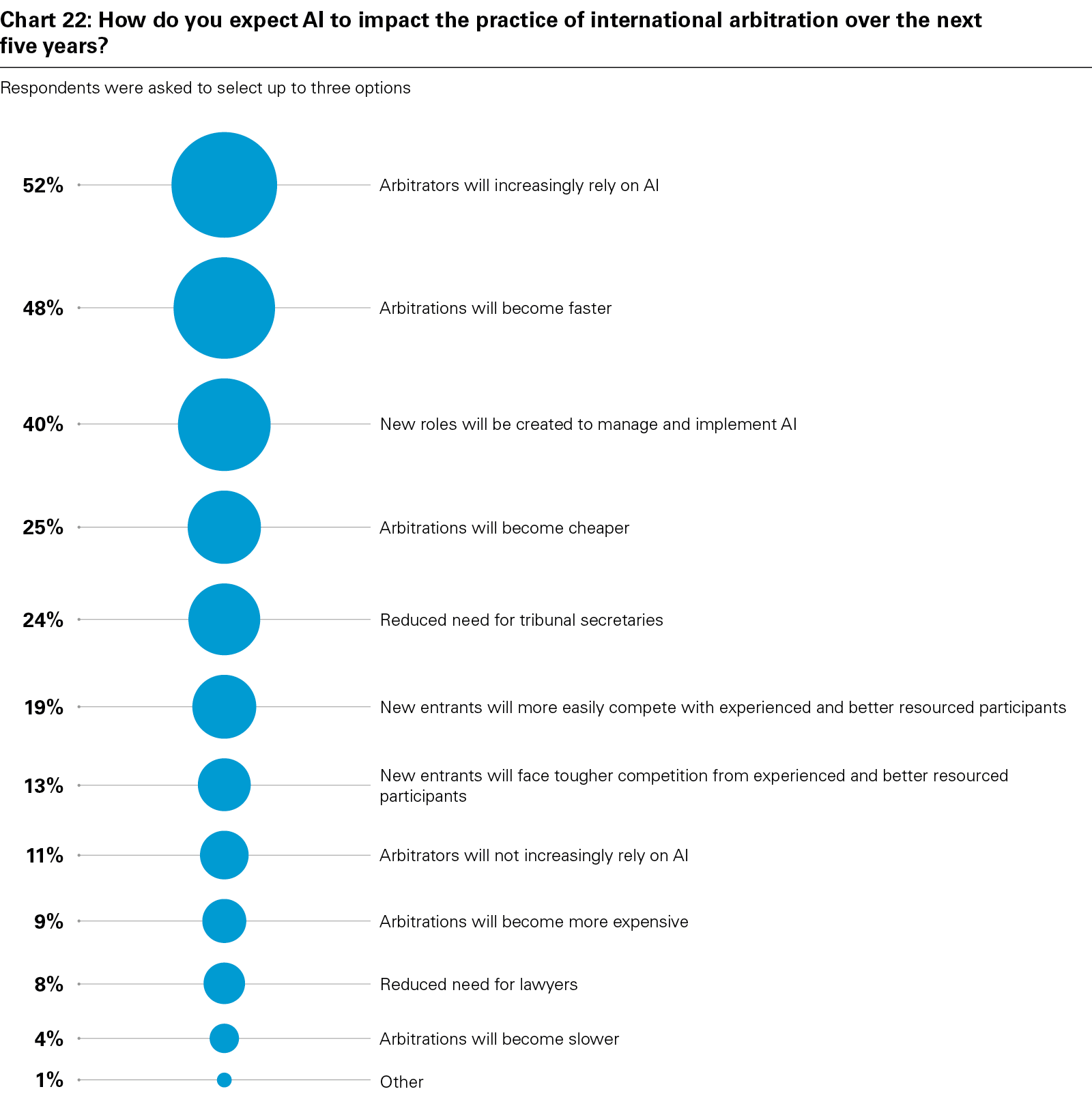
View full image: Chart 22: How do you expect AI to impact the practice of international arbitration over the next five years? (PDF)
Similarly, 24% of respondents anticipated a reduced need for tribunal secretaries. One respondent opined, "Once there will be secured platforms where AI can summarise in a way that is trustworthy, savvy arbitrators will be using this sort of tool." Interviewees worried about the ramifications of this, particularly the impact on training the next generation of arbitrators. It was suggested that the role of tribunal secretary may have to adapt, shifting towards supporting arbitrators in using AI.
As for how access to AI may impact competition among participants in arbitration, there were mixed views. 19% of respondents believed new entrants will more easily compete with experienced and better-resourced participants, but 13% expected new entrants to face tougher competition instead. While some interviewees expected that larger or better resourced law firms would be able to "staff up internally to take advantage of the new technology", others believed wider access to AI would make arbitration "[more] available and open to smaller companies and law firms", allowing them to compete more effectively.
Respondents ultimately expect that the path forward may be bumpy, but international arbitration and its users will, most certainly, both adopt, and adapt to, AI.
47 2018 International Arbitration Survey, pp.32-33 (Charts 35 and 36).
48 2021 International Arbitration Survey, pp.21-22 (Chart 13).
49 Interestingly, in our 2015 International Arbitration Survey (p.43, Chart 39), 75% of respondents thought it was appropriate for tribunal secretaries to prepare drafts of procedural orders and non-substantive parts of awards.
[View source.]